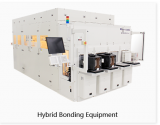Is it that time of the year again? I really don't understand their obsession with this thread. It always starts with an article posting accompanied by an exaggerated statement to bait out replies. Then its followed by a tirade of off-topic posts and arguments. The regular contributors to this thread usually just post China related semiconductor tech articles.
I read through the Bloomberg article posted and it doesn't even mention SMEE. The only paragraph even related to lithography machines just mentions 2021 ArFi systems sales by Nikon (4) and ASML (81) in China. Unfortunately the article makes the mistake of quoting Founder Securities and concluding that these are the only machines sold in China (hint SMEE isn't publically traded). Why even quote a Chinese securities company about semiconductors? The obvious media reason is to lend some faux credibility ("It's sourced from China!").
The other source quoted is Alex Capri in the Hinrich Foundation. I read through three of his articles related to the issue and guess what? Not a single mention of SMEE and the myriad of other Chinese semiconductor equipment makers like CETC. I'll list some of the issues:
- The article has no sales and revenue data for private Chinese semiconductor equipment makers (I wouldn't expect it to). So again another opaque wall where we get to argue about numbers none of us have access to.
- The author has a very limited understanding of the various Chinese semiconductor equipment makers. The articles only mention NAURA, AMEC and Hwatsing and don't go into any detail about them. In fact many of his sources is just articles from the Nikkei newspaper. Confirming yet again that we and even many "experts" don't have the hard data.
- (2018)
- (2021)
- Seriously though the article's sources aren't exactly secret and I expect many members here have already read some of these sources before.
- Unfortunately the articles many sources are from the 2018-2019 period. Not the author's fault, but just the timing of when the articles were written. China is accelerating investments into the semiconductor industry and we will need several years to see more concrete results. But anyone following this thread knows the steady pace of semiconductor tech developments coming out of China.
- SMIC revenue: $3.36B (2018), $3.12B (2019), $3.91B (2020), $5.44B (2021). Seems to me SMIC has worked out how to deal with US sanctions.
- The articles themselves deal more with the legal, business, political and geopolitical consequences, than the technical details.
Also the Bloomberg article says the US is pushing for a DUV ban, but then states:
- The US Department of Commerce and the Dutch Ministry of Foreign Affairs declined to comment.
- “The discussion is not new. No decisions have been made and we do not want to speculate or comment on rumors,” an ASML spokeswoman said.
- The only name we get for this news is Deputy Commerce Secretary Don Graves during a visit Netherlands and Belgium in May/June.
It seems to just be another feel good article with little substance. Has a DUV ban been discussed already? I bet it has been discussed since 2018 or even earlier, so what has even changed in 2022?
- His twisted logic is that SMEE somehow fooled the entire West/US into believing it has a DUV machine that is actually "non-existant". "The US didn't ban DUV exports because SMEE fooled everyone!"
- It is more believable that factions in the US simply want to hamper SMIC with a DUV ban to slow any new expansions (consequences be damned!).


